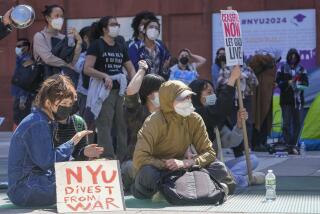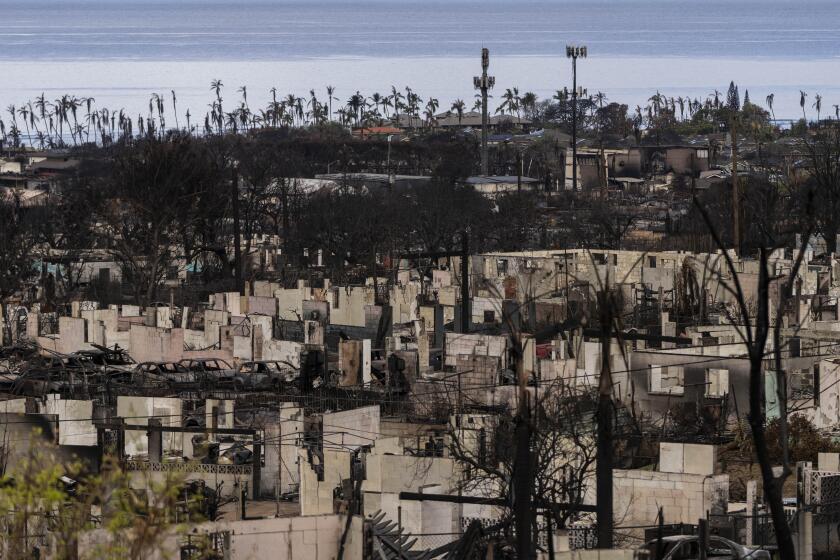Jewish-Born Cardinal Defends Visit to Israel : Controversy: French churchman’s participation in Holocaust seminar was attacked. He says critics discounted his relatives ‘who were massacred.’
Cardinal Jean-Marie Lustiger, a Jew who converted to Christianity as a teen-ager in World War II, on Wednesday rejected the bitter controversy his appearance at a Tel Aviv University theological seminar on the Holocaust has provoked.
“Saying that I am not Jewish is a denial of all my family members who died during the Holocaust,” said Lustiger, who is also archbishop of Paris. “I am a Jew, like my father, my mother, my grandfather and my grandmother and the rest of my family members who were massacred in Auschwitz and in other camps.”
But his participation in the seminar--which brought together Roman Catholics, Protestants and Jews to debate “the silence of God” during the Holocaust--was assailed by Israel’s chief Ashkenazi rabbi and other Orthodox rabbis.
Chief Rabbi Yisrael Meir Lau, himself a Holocaust survivor, said it was inappropriate to invite Lustiger to such a session, particularly since he spoke just as Israelis began their annual 24-hour commemoration of the Holocaust.
The nation’s political leaders, many Holocaust survivors and others gathered Wednesday night in Jerusalem to light candles and say kaddish, the Jewish prayer for the dead, for the 6 million Jews who perished at the hands of the Nazis.
Today, memorial services and lectures will be held across the nation. At 10 a.m., air-raid sirens will mark the start of two minutes of silence and collective remembrance in every Israeli town.
Against such a backdrop, Lau said, it was unthinkable that Tel Aviv University would invite a man who abandoned Judaism and embraced Christianity to speak on the Holocaust.
Lustiger “chose the hardest period to defect from the front of the continued existence of the Jewish people,” Lau said during his Passover sermon last Friday in Jerusalem’s main synagogue.
The cardinal “is the last man who should be invited to a conference on the lessons of the Holocaust,” Lau said. It would be more appropriate for him to “explain the silence of the flesh-and-blood Pope” on the Holocaust during the war.
At a news conference Wednesday night, Lustiger said he found such statements “bizarre.” Had he not been in Israel on Holocaust Day, Lustiger said, he would have gone to the Great Synagogue in Paris to mark the day. Today he plans to make a private visit to Yad Vashem, Israel’s Holocaust memorial, where the names of “tens” of his family members are listed among those who died.
Lustiger is the focus this year of what is an annual debate on how Israelis should commemorate the Holocaust. Fifty years after the liberation of the death camps, this nation is still struggling with how to deal with the Holocaust in textbooks, in plays and in literature.
This year, there have been controversies over:
* The decision to publish Adolf Hitler’s “Mein Kampf” here in Hebrew.
* The Ministry of Education’s decision not to include a program on the Armenian genocide in school curricula.
* A play that asserted that Hanna Senesh, a hero of the Jewish resistance, might have betrayed her comrades after she was captured and tortured by the Nazis.
Sami Shalom Shetreet, a Tel Aviv high school principal, also was publicly rebuked by parents and religious leaders this week for telling his students that they should light a seventh candle in addition to the traditional six tapers lit to mourn 6 million Jews. He said the seventh candle should commemorate homosexuals and Gypsies killed by the Nazis.
As for Lau’s bitter denunciation of Lustiger, it found resonance with many Israelis, for whom the cleric embodies two horrors: those who choose to abandon Judaism and the Catholic Church’s failure to clearly speak out and act against Nazi policies that led to the Holocaust.
“Between the spiritual annihilation, which Lustiger chose, and the physical annihilation that occurred, there is a difference of means but not of the final goal--which is the ‘final solution,’ ” Lau said.
In his presentation Wednesday night, Lustiger spoke not of his conversion to Christianity but of how, in 1973, he visited Yad Vashem and spent the day in Remembrance Hall there by himself. He fasted and prayed, “withdrawn with my thoughts.”
Finally, he recalled, a custodian approached him and said: “Don’t drown yourself in sorrow. Say kaddish and go home.” Lustiger said he took the Hebrew text the man offered, said the prayer and “silently thanked God for this caretaker who comforted me.”
Born in Paris to Jewish immigrants from Poland, Lustiger was sheltered by Catholics during the war, as were many Jews. In 1940, when he was 14, he converted. In 1954, he was ordained. Now, at 69, he is a powerful member of the church hierarchy.
Lustiger never hid his Jewishness--he reminded the audience Wednesday night that his name on his passport is still “Aharon” Jean-Marie Lustiger--and he visited Israel many times before becoming a cardinal.
He has some relatives here now. But he has not visited for 20 years, and Tel Aviv University President Yoram Dinstein said Wednesday night that “Tel Aviv University and Tel Aviv are proud that Cardinal Lustiger is here.” Dinstein termed Lustiger’s participation in the seminar an issue of academic freedom.
More to Read
Start your day right
Sign up for Essential California for news, features and recommendations from the L.A. Times and beyond in your inbox six days a week.
You may occasionally receive promotional content from the Los Angeles Times.






